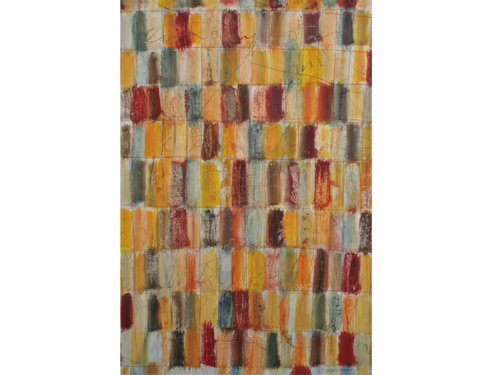
Handbills, posters, stickers, anything that can hold an idea is being plastered on the graffiti-strewn walls of the Middle East’s newest democracy-in-waiting.
Alongside all of the earnest portraits, optimistic slogans and anachronistic symbols, an enigmatic series has been popping up around my downtown haunts. There are no photos, no party logos, just words in Arabic script. Adjacent to the front door of the publishing house on the first floor of my building is a sticker bearing one word: “Mat’adineesh” (Don’t make me your enemy). On a wall outside a downtown gallery, a small poster reads: “Matistaghrabneesh” (Don’t consider me strange). In the apartment of a journalist and activist, another in the series says: “Matkafarneesh” (Don’t call me an infidel).
One carefully chosen word on a poster can communicate more than grandiose proclamations of patriotism and morality. These posters are the work of artist Bassem Yousri. His words provide a counter-narrative to the more commonplace party-led campaigns. He calls it “Hamlit Matikhsarneesh,” or “Spread a Word.”
The campaign was inspired by the bombing that took place outside the Saint’s Church in the early morning of 1 January, killing 21 people and injuring nearly 100.
“After the church bombing last New Year’s Eve in Alexandria,” Yousri tells Egypt Independent, “a group of us [artists and filmmakers] got together and asked ourselves: What can we do to make a difference?”
“We were afraid of growing extremism in Egypt. We thought that the incident would only trigger more violence between Christians and Muslims. I had the idea of making political posters.”
In Egypt, posters have long been used as a tool of political propaganda, Yousri explains, citing the posters of the Mubarak family that flooded Egypt before January. “I thought that we could use posters to propagate ideas spreading human rights and tolerance,” he said. “The words are meant to reinforce personal rights, and to encourage the public to deliver its own message to any person or authority that violates those rights.”
And indeed, by choosing words that deal with concepts surrounding human rights, the posters are as pertinent and applicable today as they were last year.
Rather than advocating a particular party or ideology, the posters represent political and social inclusion. Their understated message includes a subtle criticism of violations against human rights and freedom of expression committed by the current political system.
Part of the inclusiveness of the campaign has to do with the language of the slogans, which are written in Egyptian colloquial. The significance of using dialect is that while it is considered the language of the people, it is rarely used in the political-media realm, and certainly was not utilized for any of the campaign posters advocating candidates over the past few weeks. The dialect implies a different kind of tone and familiarity, which serves to strike a resonant chord by amplifying the meaning of the words. By using Egypt’s distinct street patois, the campaign subversively critiques the language of political discourse, and communicates its particular slogans to Egyptians from Egyptians.
The slogans themselves represent something cooperative and shared. Part of this has to do with their inception. Yousri says: “After the idea of the poster was defined, I opened a Facebook page so that people could interact and suggest phrases for the campaign. If they wanted, they could also use the posters as profile pictures. So I made posters, stickers, and soon buttons and t-shirts.”
Using the paraphernalia of an actual political campaign — slogans, social networking and merchandise — Yousri created a project that was cooperative. The slogans themselves are for the most part suggested by the broader community. The effect of this is clear when you read the posters. You realize that the slogans appeal to people’s desire for respect and dignity, and do not touch upon polemical and divisive issues. While Yousri may have established the campaign, he wanted it to flourish naturally and organically in a way that is larger than him. As a result, his project has attracted the attention of a number of volunteers who identified with its message, and wished to see these posters in their own communities. So Yousri is making the posters available for printing by individuals. He plans to open a Dropbox file soon with high-resolution images of the posters for people to print off for themselves.
“After I established [the Facebook page and the website], the Arab Digital Expression Foundation offered funding,” Yousri says. “I printed posters and stickers. Around 1000 posters have been distributed in Cairo, about 1000 in Alexandria. The posters in Alexandria came from the enthusiasm of local people who were interested in the project. An army of volunteers put them up. Volunteers in Tanta and Damietta asked to hang up posters as well.”
This is just within Egypt. A limited number of posters have also been put up in Tunisia, Jordan, the US and parts of Europe.
By using familiar means of political and public expression, Yousri is letting the average person have her say in a context where many Egyptians are disenfranchised or alienated from the recent protests, as well as the political process. Among the slogans are:
Matsakitneesh — Don’t silence me
Matisgineesh — Don’t imprison me
Mat’tilneesh — Don’t kill me
Matew'zneesh — Don’t preach to me
Each of the slogans is disarmingly simple. They state the obvious. And by stating things that cannot be contradicted, the posters address faults within the political system with honesty and humility. By addressing this system, politics themselves become inclusionary and collective, which is why this project doesn’t fall into certain ideological rifts.
“The people who are volunteering don’t have particular affiliations,” Yousri says. “The volunteers have a broad range of interests. The campaign should not be ideological. It’s not advertising for any political group.”
Instead, it’s advertising for local Egyptian society. By using a discourse of human rights, the posters have the ability to address any nation or environment, albeit in Egyptian colloquial, at least for the time being. The brilliance of the project is that while the ideas are universal, the language is local.
Bassem Yousri's next project will conducted on 7 January at Saad Zaghloul Cultural Center in a group show entitled “Shift Delete 30.”




